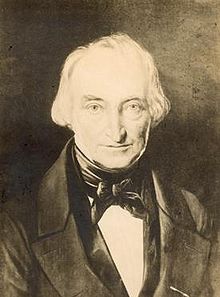William Christopher Zeise
William Christopher Zeise , also William Christoph Zeise, (born October 15, 1789 in Slagelse , † November 12, 1847 in Copenhagen ) was a Danish organic chemist. He was a pioneer in organometallic chemistry .
life and work
William Christopher Zeis came from the Zeise family . He completed an apprenticeship as a pharmacist in Copenhagen and was a lecture assistant to Hans Christian Ørsted during his chemistry and pharmacy studies . He received his doctorate in chemistry in 1817 and spent two years in chemistry laboratories in Paris and Göttingen. After returning in 1819, he opened his own chemistry laboratory in Copenhagen. From 1821 he was Associate Professor of Chemistry at the University of Copenhagen and from 1829 to 1848 Full Professor of Organic Chemistry at the Polytechnic in Copenhagen.
He was known for discovering the first organometallic compound, including Zeise's salt (1827). Zeise recognized the correct chemical composition of the Zeise salt, but could not explain the structure. There was a 20-year-long dispute with Justus von Liebig about the organometallic nature, but in the end Zeise prevailed.
He succeeded in the first synthesis of an organic sulfur compound and discovered xanthates in 1823 . Shortly before his death he wrote a Danish textbook on organic chemistry.
In 1820 he was involved in Oersted's attempts to discover electromagnetism.
From 1824 he was a member of the Royal Danish Academy of Sciences .
literature
- Entry in Winfried Pötsch, Annelore Fischer, Wolfgang Müller: Lexicon of important chemists . Harri Deutsch, 1989
- SMJørgensen: Zeise, William Christopher . In: Carl Frederik Bricka (Ed.): Dansk biografisk Lexikon. Tillige omfattende Norge for Tidsrummet 1537-1814. 1st edition. tape 19 : Vind – Oetken . Gyldendalske Boghandels Forlag, Copenhagen 1905, p. 285-289 (Danish, runeberg.org ).
Web links
- The first Organometallic Compounds (PDF; 645 kB)
Remarks
- ↑ Even before that, he obtained an organometallic compound (which he called flammable platinum chloride ) from the action of alcohol on platinum chloride
| personal data | |
|---|---|
| SURNAME | Zeise, William Christopher |
| ALTERNATIVE NAMES | Zeise, William Christoph |
| BRIEF DESCRIPTION | Danish organic chemist |
| DATE OF BIRTH | October 15, 1789 |
| PLACE OF BIRTH | Slagelse |
| DATE OF DEATH | November 12, 1847 |
| Place of death | Copenhagen |
